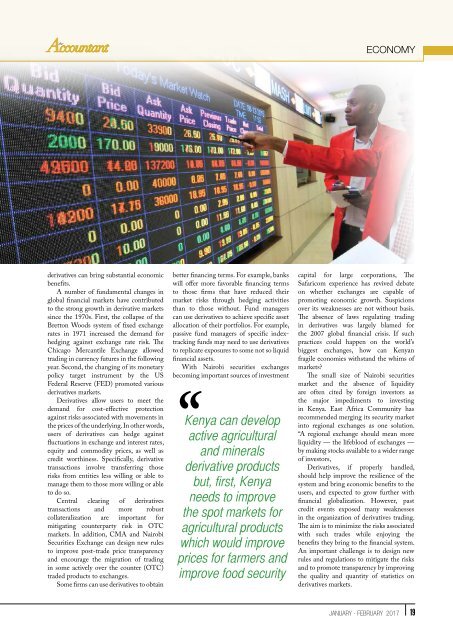The Accountant-Jan-Feb 2017
You also want an ePaper? Increase the reach of your titles
YUMPU automatically turns print PDFs into web optimized ePapers that Google loves.
ECONOMY<br />
derivatives can bring substantial economic<br />
benefits.<br />
A number of fundamental changes in<br />
global financial markets have contributed<br />
to the strong growth in derivative markets<br />
since the 1970s. First, the collapse of the<br />
Bretton Woods system of fixed exchange<br />
rates in 1971 increased the demand for<br />
hedging against exchange rate risk. <strong>The</strong><br />
Chicago Mercantile Exchange allowed<br />
trading in currency futures in the following<br />
year. Second, the changing of its monetary<br />
policy target instrument by the US<br />
Federal Reserve (FED) promoted various<br />
derivatives markets.<br />
Derivatives allow users to meet the<br />
demand for cost-effective protection<br />
against risks associated with movements in<br />
the prices of the underlying. In other words,<br />
users of derivatives can hedge against<br />
fluctuations in exchange and interest rates,<br />
equity and commodity prices, as well as<br />
credit worthiness. Specifically, derivative<br />
transactions involve transferring those<br />
risks from entities less willing or able to<br />
manage them to those more willing or able<br />
to do so.<br />
Central clearing of derivatives<br />
transactions and more robust<br />
collateralization are important for<br />
mitigating counterparty risk in OTC<br />
markets. In addition, CMA and Nairobi<br />
Securities Exchange can design new rules<br />
to improve post-trade price transparency<br />
and encourage the migration of trading<br />
in some actively over the counter (OTC)<br />
traded products to exchanges.<br />
Some firms can use derivatives to obtain<br />
better financing terms. For example, banks<br />
will offer more favorable financing terms<br />
to those firms that have reduced their<br />
market risks through hedging activities<br />
than to those without. Fund managers<br />
can use derivatives to achieve specific asset<br />
allocation of their portfolios. For example,<br />
passive fund managers of specific indextracking<br />
funds may need to use derivatives<br />
to replicate exposures to some not so liquid<br />
financial assets.<br />
With Nairobi securities exchanges<br />
becoming important sources of investment<br />
Kenya can develop<br />
active agricultural<br />
and minerals<br />
derivative products<br />
but, first, Kenya<br />
needs to improve<br />
the spot markets for<br />
agricultural products<br />
which would improve<br />
prices for farmers and<br />
improve food security<br />
capital for large corporations, <strong>The</strong><br />
Safaricom experience has revived debate<br />
on whether exchanges are capable of<br />
promoting economic growth. Suspicions<br />
over its weaknesses are not without basis.<br />
<strong>The</strong> absence of laws regulating trading<br />
in derivatives was largely blamed for<br />
the 2007 global financial crisis. If such<br />
practices could happen on the world’s<br />
biggest exchanges, how can Kenyan<br />
fragile economies withstand the whims of<br />
markets?<br />
<strong>The</strong> small size of Nairobi securities<br />
market and the absence of liquidity<br />
are often cited by foreign investors as<br />
the major impediments to investing<br />
in Kenya. East Africa Community has<br />
recommended merging its security market<br />
into regional exchanges as one solution.<br />
“A regional exchange should mean more<br />
liquidity — the lifeblood of exchanges —<br />
by making stocks available to a wider range<br />
of investors,<br />
Derivatives, if properly handled,<br />
should help improve the resilience of the<br />
system and bring economic benefits to the<br />
users, and expected to grow further with<br />
financial globalization. However, past<br />
credit events exposed many weaknesses<br />
in the organization of derivatives trading.<br />
<strong>The</strong> aim is to minimize the risks associated<br />
with such trades while enjoying the<br />
benefits they bring to the financial system.<br />
An important challenge is to design new<br />
rules and regulations to mitigate the risks<br />
and to promote transparency by improving<br />
the quality and quantity of statistics on<br />
derivatives markets.<br />
JANUARY - FEBRUARY <strong>2017</strong> 19

















